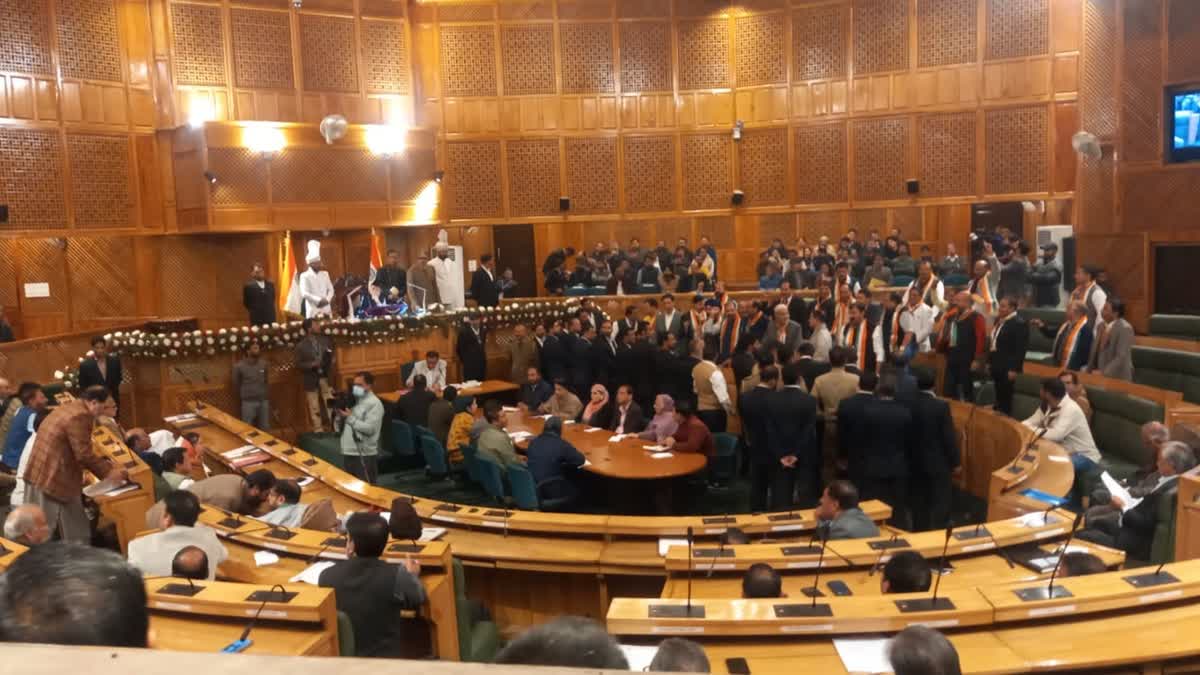Srinagar: Tussle has begun between the elected government and the District Development Council (DDC) members in Jammu and Kashmir after the DDC members alleged that the chief minister Omar Abdullah sidelined them in his first developmental review meeting.
"This was the chief minister's first review meeting, but it was unfortunate that the elected members of the council were not invited. I was invited but I boycotted after the council members were ignored," Nuzhat Ishfaq, the DDC chairperson Ganderbal said.
The Ganderbal incident indicates the first signs of confrontation that sparked off with the chief minister's visit to his constituency Ganderbal, where he inaugurated a bridge and held a review meeting with all the district officials.
The DDC members and chairpersons were calling the shots in the district administration after their election in December 2020. But, now with the elected legislators in place they fear being sidelined and interference by the MLAs.
What DDCs say
Ajaz Mir, former MLA and presently DDC Zainipora in Shopian, said tussle between the two is likely to arise concerning the powers of PRIs and MLAs.
Citing a recent example of Shopian where an MLA allegedly asked the officials to oblige the workers of his party in presence of a cabinet minister, Mir said the legislators have indicated their interfering role in the district development.
"The Lieutenant Governor should issue a clear circular regarding the powers of PRIs, including DDC members and MLAs so that there is awareness among people. Unnecessary fiddling will create confrontation between the elected representatives," Mir told ETV Bharat.
DDC Tral Harbaksh Singh said that the legislators must stay away from interfering with the PRIs and DDC plans, otherwise people will suffer if MLAs interfere.
"The MLA is a non-voting member of the DDC who has no role in the District Capex Budget.The plan will be finalised by the council. If any resolution is passed by the council, the MLAs will have no say in that," Singh told ETV Bharat.
DDC member and chairperson Baramulla Safeena Baig the legislators and DDCs have a well-defined constitutional role and they must follow it to avoid any tussle and overlapping of plans.
Pointing out the Ganderbal incident where the chief minister was accused by DDC Chairperson Nuzhat Jabbar of sidelining the council, Safeena said that it is a serious concern as it is not about an individual DDC but it is about a constitutional institution which the elected legislators want to disempower.
"But they can't disempower us because the amendment to the Panchayat Act was carried out by the parliament not by the assembly. Now, the Jammu and Kashmir assembly is not empowered to amend the Act," Safeena told ETV Bharat.
She said that the Block Development Council (BDC) chairpersons have monitoring powers of 26 departments. "The DDC formulates plans under NABARD, PMGSY schemes; we have a role in district capex, in implementation of the centrally sponsored schemes in agriculture, horticulture and skill development etc. The council has monitoring and execution roles as well. This is a local government at district level," Safeena told ETV Bharat.
Legislators speak
Former minister and MLA Sham Lal Sharma, who said that after the abrogation of the Article 370, three-tier governance system was implemented in Jammu and Kashmir and the new government of National Conference would like to derail it.
Sharma was a popular Congress leader in Jammu before he joined Bharatiya Janata Party (BJP) after the abrogation of Article 370.
"There should be no confrontation between the legislators and the DDCs as both are democratically elected with their roles well defined by the Act," Sharma, told ETV Bharat.
Dr Sajjad Shafi, MLA from Uri, said that there should be no confrontation between the DDCs and MLAs if their motive is welfare of the people of Jammu and Kashmir.
"The only bone of contention between MLAs with DDCs can be the Capex Budget plan. Else there will be no other issue with them. The government will find an amicable solution. MLAs have Constituency Development Funds (CDF) for making development plans. DDCs will have no role in that plan," Dr Sajjad told ETV Bharat.
A senior officer in the law department said that the laws have defined very well the roles of legislators and DDCs.
"Legislators have a defined role to legislate and oversee the overall governance, while the DDCs can make developmental plans. If both the parties work beyond politics, there should be no confrontation," the officer told ETV Bharat.
DDC elections in Jammu and Kashmir
The first DDC elections in Jammu and Kashmir were held in December 2020 after the Ministry of Home Affairs on October 16, 2020 effected the 73rd amendment to Jammu and Kashmir Panchayat Raj Act 1989. The amendments were carried out by way of Union Territory of Jammu and Kashmir Reorganization (Adaptation of State Laws) Fourth Order, 2020 in the exercise of powers conferred by Section 96 of the J&K Reorganization Act, 2019.
Before abrogation of Article 370, the powers to amend the laws in Jammu and Kashmir lied with the assembly. However, with the implementation of the Jammu and Kashmir Reorganisation Act (2019), the powers are vested with the Ministry of Home Affairs.
With the amendment, the BJP-led government replaced the District Planning and Development Boards of the erstwhile state in which a cabinet minister would be the chairman. It comprised MLAs, MPs, MLCs and chairpersons of Block Development Councils, municipal committee and municipal councils as members besides the District Development Commissioner. The board would frame a yearly development plan as per the budget.
But with the formation of DDCs, the board ceased to exist and was replaced by a District Planning Committee where an MLA is invited but he has no role or say in voting or changing the plan. The DDCs are empowered to frame, execute and monitor the district development plan.
Read more:



